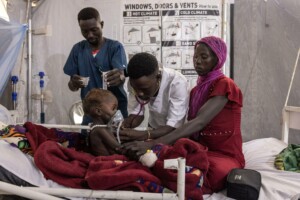Sudan OCHA bulletin 43: Viral haemorrhagic fever outbreak in Darfur
The Office for the Coordination of Humanitarian Affairs (OCHA) in Sudan reported in its latest weekly bulletin that the Sudanese Ministry of Health and the World Health Organization (WHO) reported an outbreak of viral haemorrhagic fever (VHF) in Darfur on 27 October.
The Office for the Coordination of Humanitarian Affairs (OCHA) in Sudan reported in its latest weekly bulletin that the Sudanese Ministry of Health and the World Health Organization (WHO) reported an outbreak of viral haemorrhagic fever (VHF) in Darfur on 27 October.
According to the Ministry a total of 182 suspected VHF cases, including 103 deaths, were reported in 12 localities in South, East, Central, West and North Darfur from 29 August to 25 October.
Of the 36 samples tested, eight samples from Central, West, and North Darfur tested positive for West Nile virus, while four samples from Central and West Darfur tested positive for Chikungunya virus.
The locality with the highest number of cases was West Darfur (110) followed by North and Central Darfur with 33 cases each, South Darfur (1) and finally East Darfur (5). West Darfur had the highest number of fatalities (81), North Darfur recorded 15, Central Darfur six, and East Darfur one, OCHA reports.
In response, joint Health Ministry-WHO verification teams were deployed to the affected states. Vector control activities have started and infection control measures were initiated in the affected localities. Additional pumps, fogging machines and insecticides will be transported to the affected states.
Up to 50 percent crops loss expected
According to the UN Food and Agriculture Organization (FAO) FAO, the 25 to 80 percent reduction in rainfall this year, coupled with a delayed planting period may lead to a 30-50 percent crop loss in the affected localities, thus increasing the risk of low yields during the November-January harvest period. The low harvest will intensify the coming “lean season”, between March and June.
The localities most at risk of poor harvests are concentrated in North Darfur, South Darfur and Central Darfur, as well as Hamashkoreeb locality in eastern Sudan's Kassala.

The Sudanese Ministry of Agriculture, FAO, the World Food Programme (WFP), and the Famine Early Warning Systems Network (FEWS NET) have formed a task force to deal with the potential impacts of El Niño in Sudan, the OCHA bulletin reads.
The task force will monitor and update food security information, strengthen the ongoing immediate life-saving response, and prepare a strong food security and livelihood plan for the 2016 Humanitarian Response Plan (HRP).
2,300 people affected by floods in Red Sea State
According to the Sudanese Red Crescent Society (SRCS), floods in Red Sea State destroyed 350 homes and damaged a further 215 affecting an estimated 2,300 people. From 20-22 October, the Government’s Humanitarian Aid Commission (HAC), SRCS, the Ministry of Health, WHO, and Civil Defence conducted a mission to assess the needs of the affected. The major needs identified were emergency shelter and food aid.
In response, SRCS and the local authorities distributed food. Civil Defence distributed emergency shelter and household supplies provided by the SRCS. A high emergency committee in Red Sea State is currently mobilising resources to be able to meet the needs of up to affected 750 families (about 3,000 people).
Displaced start returning to Labado village in East Darfur
According to Unamid, the 13,500 displaced people who took refuge near the Unamid team site in Labado have started to return to their home village, as the security situation in the area improved.
They fled their homes early April 2013 when fighting broke out between government forces and Sudan Liberation Movement faction headed by Minni Minawi in Labado and Muhajeriya towns.
According to community leaders, the displaced have agreed on a deadline with authorities to complete the move by 9 November. Aid organisations have yet to verify and assess the needs of the returnees, OCHA says.
4,350 displaced in Khor Abeche, South Darfur, need food aid
From 20 to 22 October, a rapid needs assessment was conducted in South Darfur’s Khor Abeche village following reports from community leaders that the 4,350 displaced people taking refuge near the Unamid team site are in urgent need of food assistance.
The people of Khor Abeche rely entirely on farming for their livelihood. The failure of the farming season could result in limited household access to food. The mission that included staff from OCHA, WFP, and World Vision International recommended distributing a two-month supply of food for seasonal support, which will be done by the WFP in November. The mission also recommended introducing a basic school feeding programme and a nutrition programme in the village.
Read the full bulletin here











 and then
and then